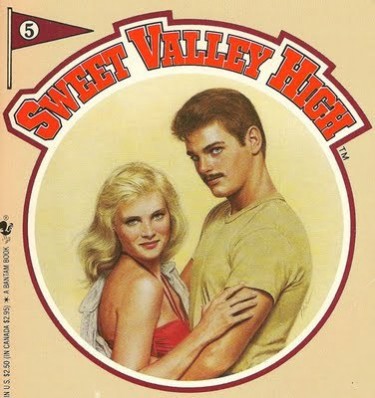How Your Sweet Valley High Gets Made
by Grace Bello

Now that Francine Pascal’s young-adult series Sweet Valley High has spawned the recent Sweet Valley Confidential and the new e-book series The Sweet Life, perhaps it’s time to explore how your Sweet Valley High gets made. I interviewed Ryan Nerz, 38, author of Eat This Book and the forthcoming MARIJUANAMERICA, and a former ghostwriter for the Sweet Valley High series (in 1998). He talks about how he — a straight man — got inside the heads of teen girls, how smoking pot helped the creative process, and how he wrote his bros into the lives of Elizabeth and Jessica Wakefield.
How did you get into [ghostwriting for Sweet Valley High]?
I worked at a place called 17th Street Productions, which is now Alloy. Back then, they were Daniel Weiss Associates. Daniel Weiss was a person who was friends with Francine Pascal, who is the woman who does Sweet Valley High. Basically, what they did was they were a book packager. They did everything but the actual making of the book and putting it out and marketing it and all that. They basically had ready-made books done. Then he sold that and it became Alloy. My boss was Ann Brashares, who wrote the Sisterhood of the Traveling Pants. There’s a whole bunch of people who came out of that group of people who all became very successful in that realm. Including Gossip Girl. That was Cecily von Ziegesar. She was an editor when I was there. It was a bunch of young people who came in, and we would sit around, drink coffee, eat bagels, and come up with ideas and concepts and laugh our faces off.
So you started as an editor there, right?
Right. Sweet Valley High is this series that just goes on and on and on. So you’re always having to come up with new plots. You’re always having to come up with new character arcs. We would just sit around and come up with new ideas. And then they would hire out freelance people, like what I eventually became. You get a one-off amount of money, which is okay. Meanwhile, Francine Pascal sits in a château in France. I’m not even sure if Francine Pascal wrote a single book, which is really funny. She just came up with the idea and the Bible for it.
So the titles that you wrote, did you pitch those ideas?
No; the would-be writers, we would have to do a two-chapter sample, about 30 pages. They have to see that you can match the style and the tone and pull the heartstrings of anonymous 13-year-old girls across the country.
Were there a lot of men writing?
There weren’t a whole lot of men. There were few men, predominantly gay, and one other guy, Daniel Ehrenhaft, who now is a fairly successful young-adult writer. Other than that, no. There weren’t many men. It was mainly post-college women. That was the main ballgame. There were some dudes. But not a whole lot.
What were the titles that you ended up writing? What were the plot lines?

Well, it’s been a while. The first one I wrote was called All About Love. It was in the Sweet Valley Senior Year [series]. At that point, “Dawson’s Creek” was becoming popular. It was becoming a little “Dawson’s Creek”-ish. They had new characters from the original Sweet Valley High. There was Conner McDermott, who was starting to become a problem drinker, and he was dating Liz. Jessica was still with Todd, and that was an old, old plot line. I don’t really remember the exact plot that I had. I just remember … You kind of write it like a screenplay. You write each scene, and it hooks you to read the next scene. At party scenes, I’d put in my friends as members of the party so that I could give it to my friends, and they would be characters in a Sweet Valley High book. To be perfectly honest, I don’t really remember the specifics of the plots.
Which specific friends did you write into the books, do you remember?
Yeah, there’s a guy called Javier Guzman, who now works at NPR. He’s a producer on the show “The Takeaway.” I turned him into some shady Puerto Rican guy at the party, which he thought was awesome. I think I wrote in my buddy Luke Barton, who’s an archaeologist at the University of Pittsburgh now. Also, Ezra Edelman, who works at HBO making documentaries. So, yeah, just a bunch of my friends.
What was the environment like when you were working there? Did you ever get to meet Francine Pascal? What was it like when you were in the office?
No, Francine Pascal was always like the voice of God from afar. She would occasionally chime in on little things saying, “No, Elizabeth would never do this.” “This tone doesn’t really work for me.” “This is too risqué.” Blah blah blah. She would kind of consult from afar. I never met her. The environment was full of young creatives. You know, young people who were vaguely hoping to make it in publishing or become editors or writers. It was a small enough company that you were able to actually affect things. You weren’t working for Miramax, but you are able to actually affect things. You could come up with your own plots and hire people that you knew.
You know, one of the things that I would do for scenes where, say, one of the girls was getting ready to go out with a guy that she really liked, and she’d be putting on makeup, I [would call] my sister and say, “Tell me the details. What you do when you put on your makeup? Tell me step by step.” And then I would write it. And my editor would say, “Jesus, are you a woman? That’s perfect!” It was all just stolen from my sister.
Nice. Was there anything that you were told was too risque that you had written?
Somewhat. I mean, you know, what you have to do to get the contract is show them that you can capture the tone, and you get it. So you know not to push it too far. But once you have a contract, I would definitely push the boundaries. I remember on SV Senior Year, we were allowed to say “damn,” “hell,” and “bitch.” Those were the three main words that we were allowed to say, but sparingly. And I wrote “damn,” “hell,” and “bitch” all over the place. And I just let them edit out whatever they wanted. There was a decent amount of making out. You could sort of insinuate that heavy petting was about to happen, but you could never graphically go there.
How did you get into the mindset of writing for a teen girl? Did you just try to match the style? Did you do research?
I had to smoke a lot of weed. I’m kind of kidding, kind of not. The first thing you have to do is read them, which is really funny for a 23-year-old guy in New York City. You’re going to a local Starbucks and hiding your Sweet Valley High books behind a Rolling Stone magazine. But, yeah, you have to read them. That’s the only way.
Basically, what you’re trying to do is emulate a consistent tone throughout the series. It’s not very conducive to finding your own voice, because the whole point is to find their voices. You have to read the specific series, but in general, once you read those kinds of books — the serial teen books — you find they’re almost like TV scripts. Very short scenes. You turn the scene on one thing. So it’ll be like: coming in, Elizabeth thinks Todd doesn’t want to go to the dance with her but he really does, but she says something that really pisses him off and then he confirms that he doesn’t want to go to the dance. You have that one little twist to the scene that grabs the reader and gets them to continue reading.
So what have you gone on to work on since then? I read that you wrote a competitive eating book. What else have you been doing since ghostwriting?
I basically did a five-year stint in the competitive eating world. I was an announcer, so I announced eating contests for a long time and traveled all over the country and the world. And I wrote a book about it … And then I sold this book about marijuana culture in America, so I’ve been spending the last year going to California and Colorado and going to places where medical marijuana is happening.
In New York, it’s like, “Why would I do that? I need to meet all these deadlines!!!”
I mean, you say that, but I have tons of friends in New York City who are extremely successful producers and writers. Instead of drinking wine in the evening, they smoke weed … They smoke, and they write ideas and may get new, fresh ideas. They may not necessarily work stoned, but they get a fresh perspective on it. You know, it’s just weird. Everyone has different ways of being functional in the world, and some people can deliver while smoking pot, you know?
Grace Bello is a freelance writer based in New York.